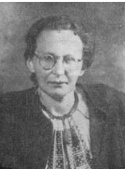Berta Bergman
Berta Bergman | |
|---|---|
 Bergman as the head of the children's polyclinic in Mostar | |
| Born | Berta Bergmann 10 May 1894 |
| Died | 15 January 1945 (aged 51) |
| Cause of death | Murdered in the Holocaust |
| Alma mater | University of Vienna |
| Occupation | Medical physician |
| Years active | 1918-1945 |
Berta Bergman (née Bergmann; 10 May 1894-15 January 1945) was a Bosnian Jewish physician and partisan. She is also well known for being the first woman to finish high school in Bosnia.[1]
Early life
[edit]Berta Bergman was born 10 May 1894 in Sarajevo, Austria-Hungary (modern day Bosnia and Herzegovina) to a family of German-speaking Jews. The eldest of four daughters, her mother Ernesta and her father Joseph were Ashkenazi Jews from Vienna. Both moved to Sarajevo during the Austro-Hungarian occupation of Bosnia as her father worked as a railway engineer for the Imperial Royal Austrian State of Railways.[2] Despite the family having a strong financial income, Bergman's mother vowed to secure a higher education for her daughters.[3]
The girls first attended gymnasium in Mostar to achieve this. Berta and her older sister Marija made headlines when in 1905, they became the first female pupils in Mostar Gymnasium.[4] In February 1912, the Croatian newspaper Narodna obrana published a report saying that Berta was the first female in Bosnia and Herzegovina to graduate from school.[5] She went on to study medicine at the University of Vienna, graduating in 1918.[1] All her younger sisters would also receive their degrees. Her sister Marija became the first Bosnian woman to be awarded a doctorate.[3]
Career
[edit]Bergman's career as a pediatrician took her across the newly established Kingdom of Yugoslavia, including Banja Luka and Mostar. After quitting her position in Banja Luka, Bergman was awarded money for her hard work and self-sacrifices. She then worked in Mostar where she became head of a successful children's polyclinic.[1]
Invasion and death
[edit]After the invasion of Yugoslavia by Nazi Germany in April 1941 and the establishment of the Independent State of Croatia, a fascist puppet state, on the territory which included Bosnia and Herzegovina, Bergman lost her job. Her sister Marija and Marija's family were deported to the Rab concentration camp, while the 49-year-old doctor Bergman joined the Partisan guerrilla resistance movement. She provided the Partisan fighters with medical care, supplies and first aid lessons. She was imprisoned twice; the capture on 15 January 1945 led to her deportation to Jasenovac concentration camp, where she was killed by the Ustaše.[1][6]
References
[edit]- ^ a b c d Husnija Kamberović, ed. (2012). Bosna i Hercegovina 1941: Novi pogledi (in Serbo-Croatian). Vol. 9. Sarajevo: Institut za istoriju. pp. 125–126.
- ^ "dr Berta J. BERGMAN - Partizansko spomen-groblje". Retrieved 2024-07-02.
- ^ a b Danon, Cezar (February 2000). "Sjećanja". Jevrejski Glas (in Serbo-Croatian). Sarajevo: Glasnik Jevrejske zajednice Bosne i Hercegovine.
- ^ "123. godišnjica djelovanja čuvene mostarske gimnazije" (in Serbo-Croatian). 23 April 2016. Archived from the original on 20 October 2016. Retrieved 22 September 2016.
- ^ Anita Dremel; Lada Čale Feldman; Lidija Dujić; Rada Borić; Sandra Prlenda; Maša Grdešić; Renata Jambrešić Kirin, eds. (2015). Uzduž i poprijeko: brak, zakon i intimno građanstvo u povijesnoj i suvremenoj perspektivi (in Serbo-Croatian). Zagreb: Centar za ženske studije. p. 107.
- ^ Danon, Jakov; Stošić, Verica (2010). "Memoari na holokaust Jevreja Krajine" (in Serbo-Croatian). Banja Luka: Jevrejska opština Banja Luka: 185.
{{cite journal}}: Cite journal requires|journal=(help)
- Bosnia and Herzegovina Ashkenazi Jews
- Bosnia and Herzegovina pediatricians
- Bosnia and Herzegovina people of Austrian descent
- Women pediatricians
- People who died in Jasenovac concentration camp
- Bosnia and Herzegovina Jews who died in the Holocaust
- University of Vienna alumni
- Yugoslav Partisans members
- Jews in the Yugoslav Partisans
- People from Mostar
- 1892 births
- 1945 deaths
- Women in the Yugoslav Partisans
- Bosnia and Herzegovina military doctors
- Yugoslav pediatricians
- Resistance members who died in Nazi concentration camps
- People of Austrian-Jewish descent
